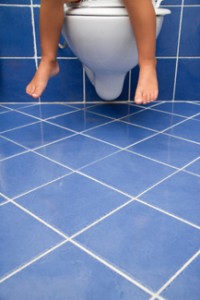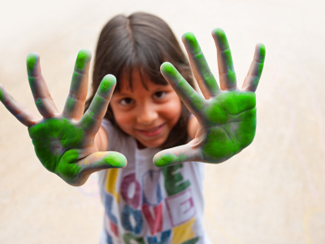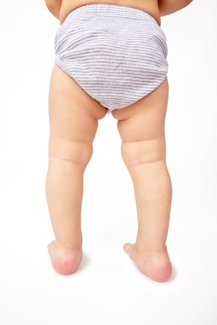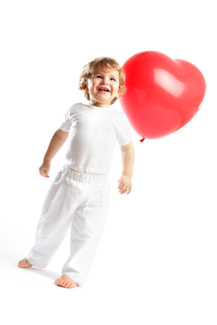When my husband and I decided to start potty training our two-year-old this summer, we agreed to be patient, let her lead but with some firm direction, and not dazzle her with sugar. I won’t say that we’ve been obsessive about her eating habits since she started on solid foods, but I will say we are hyper aware of what she eats and her nutrition is of utmost importance. Because of that, my daughter turns away offerings of cake, ice cream, or even small pieces of candy. However, she’ll knock you over for a bite of avocado.
I’ve watched friends charm the training pants off their toddlers with promises of suckers and candies to convince them to potty on the toilet; specifically one incident where one-and-a-half Fun Size candy bars and a handful of M&Ms were used to reward a toddler for taking care of business. That’s a lot of sugar and calories for a little tinkle. My daughter gets none of that. She gets high-fives, a big cheer along the lines of “great job! I’m proud of you!”, and two or three squares of toilet tissue.
This, I kid you not, is a really big deal to her. That she is allowed to get squares of toilet tissue to clean up is like she’s arrived at the throne of the big girls. Every time she potties she announces, “I get tissue now!” and she is proud of it. She earned it. Not long from now I won’t be able to reward her with septic-friendly paper, but for now, I’m totally rolling with it.
I can feel half the world rolling their eyes at me, but that’s the decision my husband and I made – candy-free potty training. It’s the choice that’s right for our daughter. Maybe it’s not right for your child, but I at least ask you to listen with an open mind and consider that maybe it might just work.
“I strongly believe that children should be rewarded with attention and kind words, not food,” said our resident dietitian Mary Hartley, RD. “Show love with hugs and kisses.”
After nearly a month of potty training, our daughter is nearly out of diapers when at home (except for sleeping), and tonight we even successfully left the house for two hours with a diaper and no accidents. We’re making great progress… one trip to the frog potty at a time, one high five and “way to go!” at a time.
“Using food as kids reward causes them to associate food w/success & sets a pattern leading to obesity & addiction,” Tweeted Pamela Reilly, Naturopathic Nutritionist, CNHP, CNC, CPH at @PamelaReilly1.
I agree with Reilly. Rewarding behavior with food at even the earliest age creates a lifetime habit. Her comment, and my aversion to rewarding potties with Pez, reminds me of one of my favorite quotes found on Pinterest – “Do not reward yourself with food. You are not a dog.”
As well, rewarding with candy and other junk food is doing nothing nutritionally for your child. So while you may be creating one positive habit by having them use a toilet, you’re creating a whole other habit where they learn to not like healthy foods.
“Obviously, sugary foods are often devoid of nutrients and so too many will create a nutritional risk situation,” said Hartley. “But the bigger problem is in grooming kids to prefer highly pleasurable sweet taste sensations at the expense of the subtler non-sweet flavors found in the wide world of nutritious foods.”
I knew I wasn’t alone when we started candy-free potty training, and thankfully a few other moms spoke up and said it worked for them.
“He was trained in four days, without food or treats,” said Laura Dennis (@adoptedreality), a mom of two who incentivized her just-over two-year-old son Maksim with a little ego boost. “The only incentive was to be a big boy like all of the other kids (he’s the youngest at his preschool). Laura had some help preparing Maksim for his graduation to underwear, his preschool teacher. Mom and teacher coordinated together, preparing Maksim for the big change, and when the scheduled Monday came, they made it happen. Without food.
 On that day, “Maksim woke up, I took off his diaper and had him put on his Cars underpants. He loves Lightening McQueen, so he took it very seriously when I told him that McQueen would be mad if Maksim ‘peed on him.’ This he understood.”
On that day, “Maksim woke up, I took off his diaper and had him put on his Cars underpants. He loves Lightening McQueen, so he took it very seriously when I told him that McQueen would be mad if Maksim ‘peed on him.’ This he understood.”
I had friends take a similar approach with their toddler daughter. I asked her about her big-girl panties one day and she very seriously told me, “We don’t potty on Dora.” And she didn’t.
Praise and a little activity helped Saria Lofton, a former school nurse who now discusses nutrition and child development at WhollyBeginnings.com (@SariaWB) potty train her daughter. “Potty training my daughter was easy. I did two things: 1) We did the potty dance every time she went to go urinate and it had a beat to it, “Pee-pee in the potty, pee-pee in the potty!” 2) I praised her a lot when she did go and bragged to my mother or sister in front of her of “what a big girl Mackenzie is…she went to the potty all by herself!'”
My daughter doesn’t potty dance, but she does love running to my husband or I with both hands in the air (potties deserve double high-fives) and then across the room to the other one. “I did it,” she’ll shout. That self-pride is almost all the reward she needs.
“[With food] you could unintentionally be teaching your child to reward him or herself with sweets for even the most mundane tasks,” said Brooke Randolph, LMHC, our resident mental health expert with a specialty in family and child counseling. “I would much rather self-esteem was the reason a child was motivated to do the things expected of him or her.”
Food is readily available in our crazy world, but too often self-esteem and self-love are lacking. Why wouldn’t we shower our kids with as much of that as possible during one of their life’s truly triumphant moments? Sure, they’ve learned how to walk, but this is something they’re old enough to enjoy being a part of! And who doesn’t love their own success?
As I stated previously, high fives won’t work for everyone, but candy still doesn’t have to be the reward. We talk all the time about non-food rewards for weight loss, and the same idea applies at any age.
“Potty training can be a complicated transition for both parents and children. While some children may respond to positive reinforcement, some children may need more motivation, and some parents may want to provide additional motivation,” Randolph explained. “It only requires a little bit of thought to come up with non-food reinforcements that can be paired with verbal reinforcement.” Some of the non-food rewards that she came up with include:
- Taking a walk with a parent or a parent and a pet
- Spending time with a favorite adult
- Using educational apps
- New art supplies
- Balloons
- Bean bags
- A book or coloring books
- Playing a game
- Costume jewelry
- A coin for their piggy bank
- Trip to the library
- Stickers
“I am a mother of one child and never used food as a reward for potty training,” said Caren Begun of MommysPointofView.com. “Instead there was a lot of singing songs and lots of high fives, and hugs and kisses, and getting all out silly and doing a ‘potty dance’ to the words from Look Who’s Talking Too — ‘pee pee in the potty, whoo’ all in a conga line way.”
Growing up my dad used to tell my siblings and I that he didn’t always have the right answers, but that he hoped one day we’d look back and appreciate that he chose the one that he thought was right. More than ever I know what he means. Not all of my parenting decisions will be the right ones, but I will always trust in my gut that they are. And when it comes to not training my daughter’s best behaviors, including pottying, with food, especially the nutrient-void kind full of processed sugars and fat, I simply will not do it.
“There are many reasons to not use candy or other food items as a part of potty training, but very few reasons to use it as a reinforcement,” said Randolph.
Also Read:
Running with a Jogging Stroller Provides a Greater Calorie Burn
Video: Cookie Monster’s “Call Me Maybe” Spoof Cuts Calories by Sharing
The Benefits of Breastfeeding and the Attachment Parenting Controversy
